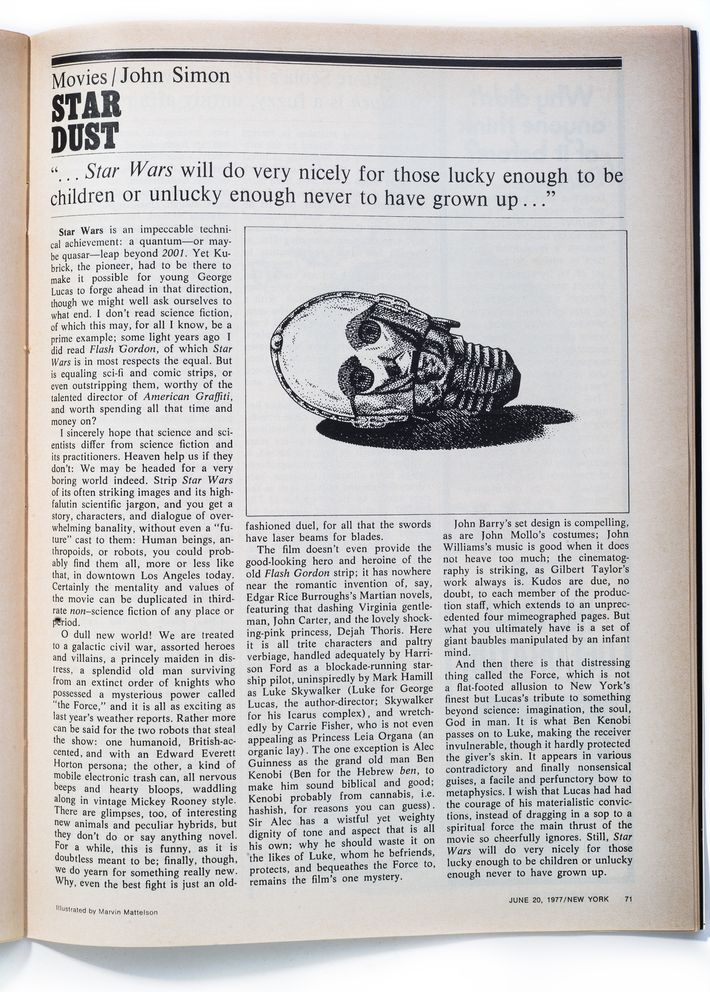
To commemorate the forthcoming release of Star Wars: The Last Jedi, we present the vaguely bemused but mostly belittling review that New York Magazine ran after the release of the original Star Wars, now annotated by its author, John Simon, based on a 2015 conversation we had with him about blockbuster cinema.
Star Wars is an impeccable technical achievement: a quantum — or maybe quasar — leap beyond 2001. Yet Kubrick, the pioneer , had to be there to make it possible for young George Lucas to forge ahead in that direction, though we might well ask ourselves to what end. I don’t read science fiction, of which this may, for all I know, be a prime example; some light years ago I did read Flash Gordon, of which Star Wars is in most respects the equal. But is equaling sci-fi and comic strips, or even outstripping them, worthy of the talented director of American Graffiti, and worth spending all that time and money on?
I sincerely hope that science and scientists differ from science fiction and its practitioners. Heaven help us if they don’t: We may be headed for a very boring world indeed. Strip Star Wars of its often striking images and its highfalutin scientific jargon, and you get a story, characters, and dialogue of overwhelming banality, without even a “future” cast to them: Human beings, anthropoids, or robots, you could probably find them all, more or less like that, in downtown Los Angeles today. Certainly the mentality and values of the movie can be duplicated in third-rate non-science of any place or period.
O dull new world! We are treated to a galactic civil war, assorted heroes and villains, a princely maiden in distress, a splendid old man surviving from an extinct order of knights who possessed a mysterious power called “the Force,” and it is all as exciting as last year’s weather reports. Rather more can be said for the two robots that steal the show: one humanoid, British-accented, and with an Edward Everett Horton persona; the other, a kind of mobile electronic trash can, all nervous beeps and hearty bloops, waddling along in vintage Mickey Rooney style. There are glimpses, too, of interesting new animals and peculiar hybrids, but they don’t do or say anything novel. For a while, this is funny, as it is doubtless meant to be; finally, though, we do yearn for something really new. Why, even the best fight is just an old-fashioned duel, for all that the swords have laser beams for blades.
The film doesn’t even provide the good-looking hero and heroine of the old Flash Gordon strip; it has nowhere near the romantic invention of, say, Edgar Rice Burroughs’s Martian novels, featuring that dashing Virginia gentleman, John Carter, and the lovely shocking-pink princess, Dejah Thoris. Here it is all trite characters and paltry verbiage, handled adequately by Harrison Ford as a blockade-running starship pilot, uninspiredly by Mark Hamill as Luke Skywalker (Luke for George Lucas, the author-director; Skywalker for his Icarus complex), and wretchedly by Carrie Fisher, who is not even appealing as Princess Leia Organa (an organic lay). The one exception is Alec Guinness as the grand old man Ben Kenobi (Ben for the Hebrew ben, to make him sound biblical and good; Kenobi probably from cannabis, i.e. hashish, for reasons you can guess). Sir Alec has a wistful yet weighty dignity of tone and aspect that is all his own; why he should waste it on the likes of Luke, whom he befriends, protects, and bequeathes the Force to, remains the film’s one mystery.
John Barry’s set design is compelling, as are John Mollo’s costumes; John Williams’s music is good when it does not heave too much; the cinematography is striking, as Gilbert Taylor’s work always is. Kudos are due, no doubt, to each member of the production staff, which extends to an unprecedented four mimeographed pages. But what you ultimately have is a set of giant baubles manipulated by an infant mind.
And then there is that distressing thing called the Force, which is not a flat-footed allusion to New York’s finest but Lucas’s tribute to something beyond science: imagination, the soul, God in man. It is what Ben Kenobi passes on to Luke, making the receiver invulnerable, though it hardly protected the giver’s skin. It appears in various contradictory and finally nonsensical guises, a facile and perfunctory bow to metaphysics. I wish that Lucas had had the courage of his materialistic convictions, instead dragging in a sop to a spiritual force the main thrust of the movie so cheerfully ignores. Still, Star Wars will do very nicely for those lucky enough to be children or unlucky enough never to have grown up.


